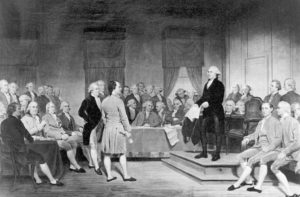The world has benefitted immensely from global trade and freedom of movement, but since September 11, 2001, we have also increasingly seen the darker side of a more interconnected world. It is time to take a step back and assess the political reality world leaders created. At the end of this process, we may find that the Founding Fathers were even wiser than most people think.
Peak Globalization
Peak globalization occurred after the fall of the Soviet Union in 1991. The West went into a frenzy over the victory of capitalism over communism, epitomized by the 1992 book The End of History and the Last Man by Francis Fukuyama. Almost everyone agreed that a more open world with free movement of goods, services, and people was good.
However, the corpse of the Soviet Union was still warm when the European Union was created in 1993. It was celebrated as an institutionalization of globalization, but stripped of bravado and fanfares, it is a centralization project: unifying local nations into a global entity under a common administration, policy, and currency.
It didn’t just happen there. Influential politicians and corporations were making an annual trip to Davos, where they shaped world policies. In 2001, China was admitted into the World Trade Organization, despite a pattern of cheating, environmental crimes, slave-like labor conditions, and intellectual property theft from Western corporations. Centralization and consolidation of power were occurring everywhere. Most people did not notice, but global cooperation between local independent entities was rapidly being transformed into international institutions in the hands of a small ruling elite.
Post-911
The September 11 terror attacks became a wake-up call for many people in the West. Twenty years later, people who fly within their own country are now subjected to the same security measures as traveling to a war zone on the other side of the globe. There was a time when there were no security checks – and the TSA, of course, has only been around since 2001. In fact, before FAA regulations – and eventually federal law – changed in response to a 1961 hijacking, American passengers weren’t prohibited from taking guns with them. Now, they can’t even bring a bottle of water.
While both parties praised trade with China, American factory workers were being replaced by fentanyl addicts in the rust belt. It went largely unnoticed because it only hurt ordinary people. They were arrogantly told they should “learn to code” if they complained. The elites only took notice when a potty mouth from New York was elected president in 2016 by addressing the issues of globalism. Since then, the crisis of pandemics has only further strengthened people’s concern with open borders.
Local Safe Space
When the Founding Fathers of the United States fought for independence from the British Empire, they recognized the weakness and failure of the confederation established in 1781 after the American revolution. Thus, they understood the need for some unifying power structure that could negotiate internationally on behalf of the individual states and organize a standing army to protect the borders from foreign invasion.

(Getty Images)
The republic that replaced the confederation was intended as a safe space for localism. Each state would be free to pursue its own laws and government within the security of a larger nation. People could vote at the ballot box or with their feet by moving to another state that better suited their values.
Although it meant a centralization of foreign policy powers, the purpose was to secure local self-determination. In hindsight, many of the problems that the authors of the Anti-Federalist papers warned about came true. The checks and balances that the Founding Fathers put in place were insufficient to prevent the government from slowly being captured by elites who do not believe in localism and individualism.
That does not mean that the federation was a failed project or poorly designed, only that later generations failed their responsibility to uphold and strengthen the spirit of the union. The slow erosion of localism in the United States is the same tendency that corrupted decentralized globalization into centralized globalism in the last 30 years. That they have similar causes is an opportunity for reflection and an informed return to localism in America.
Most of the problems of the last few decades have one thing in common: a dissolution of local cohesion, from families and local communities to a national cultural identity. Too much power has been concentrated too far away from ordinary people.




